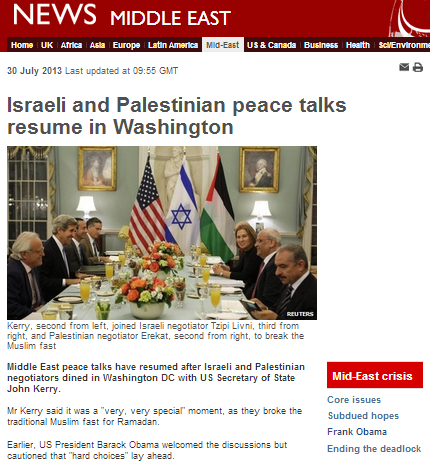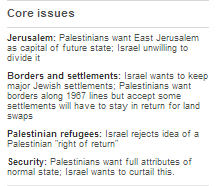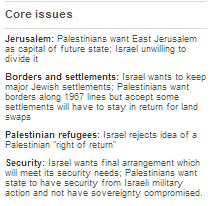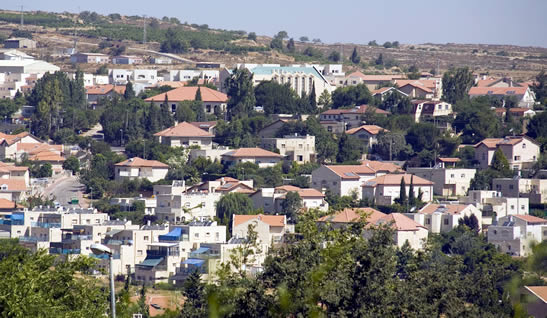July 30th 2013 saw the appearance of two articles on the Middle East page of the BBC News website relating to the renewal of talks between Israeli and Palestinian negotiators in Washington.
The first, titled “Israeli and Palestinian peace talks resume in Washington“, appeared just before 10 a.m. GMT and – with these talks actually being talks about talks – offered little of actual substance to the reader, unless one has a particular interest in the seating arrangements at the State Department dinner.
“Seated opposite Mr Kerry was Israel’s chief negotiator, Justice Minister Tzipi Livni, and next to her was her Palestinian counterpart Saeb Erekat.”
Like previous BBC reports on the subject, this one also plays down the crimes committed by the prisoners slated for release by Israel as a ‘goodwill gesture’ to meet Palestinian demands – some of whom are Palestinian and some of whom are Israeli Arabs, although readers would not be aware of that fact from this report.
“The talks resumed after three years as Israel approved the release of more than 100 Palestinian prisoners.
The releases, which split the Israeli cabinet, are to take place in stages over several months.”
Towards the end of the article, what appears to be a tentative BBC acknowledgment of the violent crimes and acts of terrorism of which these prisoners were convicted in fact misleads audiences by implying that only some of them are murderers when in fact, as can be seen on the translated list which we published here several weeks ago, the vast majority are imprisoned for murder or accessory to murder.
“Also on Sunday, the Israeli cabinet approved the release of 104 long-term Palestinian prisoners by 13 votes to seven.
The inmates are to be released in four stages over a number of months, linked to progress in the peace process.
Their identities have not been published, but according to reports they include those who have killed Israelis or Palestinian informers.”
Revealingly, despite its considerable interest in this subject, the BBC has not seen fit to send any of its Jerusalem-based correspondents off to interview any of the victims’ family members who will be directly affected by this move.
This article also rehashes the now standard inaccurate BBC slogans about the demise of the last round of talks in September 2010.
“The issue of settlement-building halted the last direct talks in September 2010.”
In fact, it was the Palestinian negotiators who refused to continue direct negotiations in late September 2010. The statement fails to inform readers that prior to that break-down in talks, a ten-month freeze on construction had been implemented by Israel in order to encourage the renewal of discussions, but the Palestinian Authority failed to come to the negotiating table for nine of those ten months and then used the end of the construction freeze on September 26th 2010 as a pretext to refuse to continue talks.
And of course the article also includes the usual standard politically partisan statement:
“Settlements are considered illegal under international law, although Israel disputes this.”
Yet again, not the slightest attempt is made to inform readers of the wider aspects of the issue beyond that trite slogan, to present alternative views on the subject or even to inform BBC audiences of the fact that there are opposing views to it which come from non-Israelis.
This article also has a number of appendages. The filmed report by Bethany Bell discussed here is reproduced in it and there is ‘analysis’ from Kim Ghattas in Washington. A side bar is also devoted to the subject of what the BBC defines as “Core issues”.
This simplistic shoe-horning of selected factors into one sentence severely misleads audiences on all four of the issues highlighted by the BBC. No explanation is given as to why Israel opposes the division of its capital city (and resulting loss of important cultural and religious sites) and no background on the fact that Jerusalem was only divided when it was under a nineteen-year illegal Jordanian occupation is offered.
The claim that “Palestinians want borders along 1967 lines but accept some settlements will have to stay in return for land swaps” [emphasis added] is patently false, as was explained here on the previous occasion that the BBC tried to promote that myth. And of course the BBC refrains from informing its audiences that as recently as July 29th, Mahmoud Abbas told reporters that:
“…no Israeli settlers or border forces could remain in a future Palestinian state and that Palestinians deem illegal all Jewish settlement building within the land occupied in the 1967 Six Days War.[…]
“In a final resolution, we would not see the presence of a single Israeli – civilian or soldier – on our lands,” Abbas said in a briefing to mostly Egyptian journalists.”
The BBC fails to inform audiences of the significance of the issue of the ‘right of return’ because it would result in the end of Jewish self-determination and the euphemistic claim that “Palestinians want full attributes of normal state; Israel wants to curtail this” conceals from readers that the issue is actually the demilitarization of a potential Palestinian state.
Whilst the BBC’s “core issues” inevitably present Israel as the stubborn nay-sayer which is preventing the outbreak of sweetness and light in the Middle East, they also conceal from BBC audiences the somewhat more crucial factor of divisions in Palestinian ranks and the fact that those sitting at the Washington dinner table cannot claim to represent the entire Palestinian people, some of whom (including Iranian-backed terror organisations) are doggedly opposed to these talks.
A revised – but not improved – edition of that same misleading sidebar of “core issues” also appears in the second article on the same subject published later in the day on July 30th and titled “Israeli-Palestinian peace talks: Nine-month deal goal“.
The article includes the same inaccurate and misleading statements concerning prisoners and ‘settlements’ as its predecessor.
“The issue of settlement-building halted the last direct talks in September 2010. Settlements are considered illegal under international law, although Israel disputes this.
On Sunday, the Israeli cabinet approved the release of 104 long-term Palestinian prisoners by 13 votes to seven.
The inmates are to be released in four stages over a number of months, linked to progress in the peace process.
Their identities have not been published, but according to reports they include those who have killed Israelis or Palestinian informers.”
In other words, the BBC continues to fail to meet the public purposes defined in its charter – and hence to sell its funding audiences short – by failing to provide anything beyond the inaccurate, partial and politically motivated narrative which it exclusively and intensively promotes.







